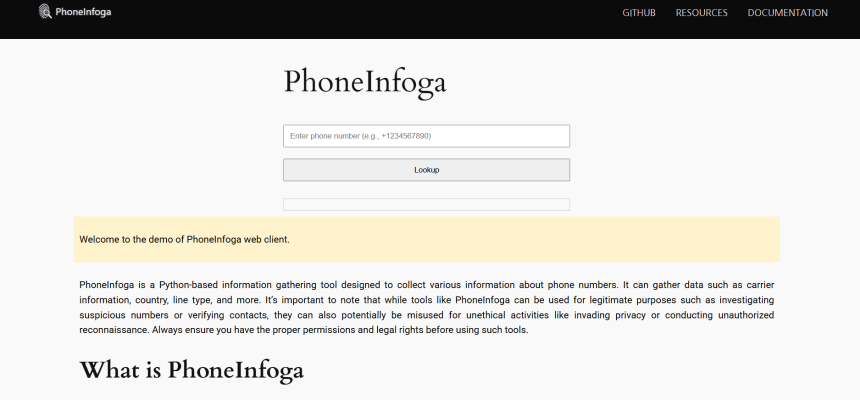In today’s digital era, phone numbers carry more information than ever before. From security analysts to investigative professionals, the ability to extract detailed data from a phone number can be a game-changer. PhoneInfoga is one such powerful tool designed to gather extensive details about phone numbers, enabling users to explore information like carrier details, country of origin, and even geolocation data. This article explores the breadth of data PhoneInfoga collects, how it works, and why it has become an indispensable resource in investigations and security assessments.
Understanding PhoneInfoga and Its Purpose
PhoneInfoga is an open-source reconnaissance tool designed for extracting valuable data linked to phone numbers. Initially created for OSINT (Open Source Intelligence) investigations, it helps security professionals, journalists, and researchers identify and analyze phone number information efficiently. The tool’s primary purpose is to gather publicly available data associated with a number without infringing on privacy laws, making it a reliable resource for ethical investigations.
The data collected by PhoneInfoga can reveal critical insights, helping detect fraud, verify identities, track suspicious activities, and support cybersecurity efforts.
Core Data Points Extracted by PhoneInfoga
PhoneInfoga gathers a wide array of information from phone numbers, focusing primarily on publicly accessible and non-intrusive data. Below are the essential data types the tool typically collects:
Phone Number Format and Validation
One of the initial steps PhoneInfoga performs is validating the phone number. It checks whether the number is properly formatted according to international standards, mainly using the E.164 format. This validation ensures the number is potentially active and correctly structured for further analysis.
Validation also includes determining if the number is fixed-line, mobile, or VOIP (Voice Over Internet Protocol). This classification helps narrow down the nature of the phone number, which is vital for contextual investigations.
Country of Origin
Identifying the country associated with a phone number is one of the most straightforward yet important pieces of information PhoneInfoga retrieves. The tool uses country calling codes (e.g., +1 for the US, +91 for India) to map numbers to their respective countries.
This data is crucial for investigators who need to narrow down their search geographically or verify the legitimacy of a number claiming to originate from a particular region.
Carrier and Network Provider
PhoneInfoga also extracts information about the carrier or network provider servicing the phone number. Knowing the telecom company behind a number can provide context, such as the region it operates in or the type of services offered.
Carrier data aids in tracking suspicious activities, especially in fraud detection and telecommunication abuse cases. It can also help confirm whether a number is associated with known fraudulent providers or suspicious network origins.
Geolocation Data
While PhoneInfoga itself does not directly pinpoint a phone number’s exact location in real time, it can provide general geolocation information based on the country code and area code prefixes. This can narrow down the number’s regional origin to a city or state level in many cases.
This generalized geolocation insight is valuable for investigations needing to localize phone activities without infringing privacy laws or engaging in intrusive tracking.
Carrier Status and Number Portability
In some cases, PhoneInfoga can reveal whether a phone number has been ported to another carrier. Number portability allows users to retain their phone numbers while switching service providers, which can complicate investigations.
Knowing the current carrier status versus the original carrier helps maintain accurate data on the number’s history and reduces the chances of being misled by outdated records.
Detection of Temporary or Disposable Numbers
PhoneInfoga has the ability to flag numbers that belong to temporary or disposable phone services. These numbers are often used to conceal true identity in scams, fraud, or anonymous communication.
Recognizing disposable numbers can alert investigators to potential risks or the need for deeper scrutiny of the numbers’ activities.
Online Presence and Publicly Available Records
Beyond basic telecommunication data, PhoneInfoga can sometimes scan for the phone number’s presence on public databases, social media platforms, or websites. This includes looking up the number in data leaks, forums, or publicly indexed sources.
This additional layer of information can reveal user profiles, associations, or even involvement in suspicious activities linked to the number.
How PhoneInfoga Collects This Data
PhoneInfoga relies heavily on OSINT techniques, leveraging publicly available APIs, telecom databases, and web scraping methods. The tool integrates with multiple sources to gather comprehensive data without violating privacy or legal restrictions.
Use of Public Telecom APIs
Many telecom providers offer public or semi-public APIs that provide information about phone numbers, including carrier details and number validity. PhoneInfoga taps into these APIs to retrieve real-time and updated data efficiently.
Web Scraping and Data Mining
The tool also performs web scraping on websites and databases that list phone number information, such as phone directories, business listings, or social media profiles. This allows PhoneInfoga to augment its data with context about the number’s usage or ownership.
Integration with Security Databases
PhoneInfoga can check phone numbers against known fraud or spam databases to flag suspicious numbers. This integration helps security professionals identify numbers involved in malicious activities quickly.
Practical Applications of PhoneInfoga Data
PhoneInfoga is a versatile tool with broad applications across multiple fields. Here are some of the common practical uses of the data it collects:
Security and Fraud Detection
Financial institutions, online platforms, and cybersecurity teams use PhoneInfoga to detect fraud by verifying phone numbers associated with transactions, registrations, or communications. By analyzing carrier and geolocation data, they can flag numbers that appear suspicious or don’t align with user profiles.
Law Enforcement and Investigations
Law enforcement agencies utilize PhoneInfoga to gather intel during investigations involving phone communications. Knowing the origin, carrier, and potential online presence of a phone number can help track suspects, victims, or witnesses.
Journalistic Research
Investigative journalists use PhoneInfoga to verify sources, trace phone numbers linked to news stories, or uncover hidden connections. The tool’s ability to reveal detailed information supports fact-checking and exposes fraudulent schemes.
Personal Safety and Verification
Individuals concerned about unknown calls or potential scams can use PhoneInfoga to identify suspicious numbers. The data helps users make informed decisions before responding or sharing personal information.
Limitations and Ethical Considerations
While PhoneInfoga provides a wealth of information, it also has limitations:
- It cannot provide real-time, precise location tracking or access private user data.
- The accuracy of carrier and geolocation data depends on available public databases.
- Temporary or spoofed numbers may evade detection or yield incomplete results.
Ethically, users must respect privacy laws and use the tool responsibly. PhoneInfoga is designed for legal, open-source intelligence gathering and should not be used for harassment, stalking, or unauthorized surveillance.
Future Developments and Enhancements
PhoneInfoga continues to evolve with improvements focused on expanding data sources, enhancing accuracy, and integrating AI to better detect suspicious patterns. As telecom technology advances and privacy regulations change, PhoneInfoga adapts to provide reliable data while adhering to ethical standards.
Conclusion
PhoneInfoga collects extensive data from phone numbers, including validation, country of origin, carrier information, general geolocation, carrier status, and detection of disposable numbers. It supplements this core data by scanning public records and security databases, making it a powerful tool for security professionals, investigators, journalists, and individuals alike.






